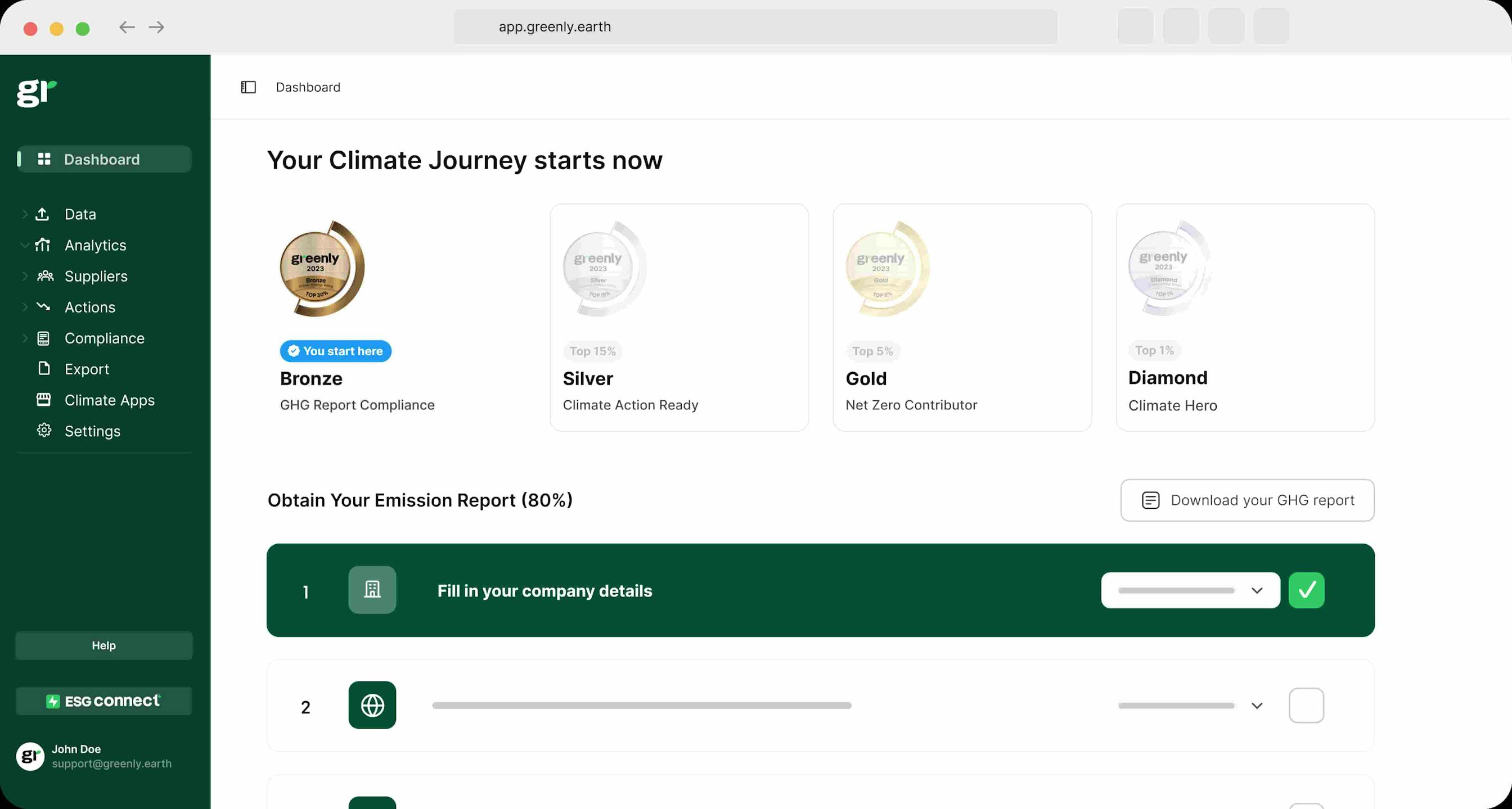
Impacts, Risks, and Opportunities (IRO) for CSRD Reporting
In this article, we’ll break down what IROs are, how to identify and assess them, and what CSRD requires in terms of disclosure.
ESG / CSR
Industries



Marketing is stressful enough, especially in today’s day and age where attention spans are shorter than ever before – but green marketing adds a new layer and dimension to the struggle to attract and retain people’s interest.
Green marketing is becoming more popular as companies seek to transition to more sustainable business practices, but the sudden expectations placed on companies to prevent greenwashing may be too much to handle.
In this article, we’ll review what green marketing is, why it is important, and how businesses should adjust their own marketing tactics accordingly in order to align with a greener future.
Green marketing refers to the style of marketing which caters to advertising a product or service based on their true environmental criteria as opposed to greenwashing – which is when false claims are made to make a product or service appear more eco-friendly than it actually is.
A green marketing is often implemented not only to demonstrate environmental sustainability and sustainable practices, but the use of green marketing campaigns can help to illustrate greater corporate social responsibility (CSR) and an effort to pertain to environmentally conscious consumers.
Adopting sustainable business practices and green marketing efforts may seem out of reach for many companies, but luckily – there are several ways in which companies can employ green marketing initiatives.
Other common examples of green marketing strategies companies may choose to implement include:
Green marketing and developing a green marketing strategy has become an essential tactic for marketing teams seeing as customers and investors alike have grown interested in spending their time and money on products companies can demonstrate as a worthwhile sustainable effort.

Green marketing is important for a multitude of reasons, however – the most important being that it is becoming an imperative marketing strategy for companies who wish to avoid greenwashing and create a business that exhibits longevity.
👉 Did you know that up to 77% of people consider a brand’s sustainability before committing to purchasing a product or service?
Here are just a few reasons why green marketing is important in today’s day and age:
Green practices and overall environmentally conscious behavior is becoming a compulsory element to a more sustainable future, which can include simple yet approachable business practices such as seeking to decarbonise your supply chain, use recycled materials, and practice responsible waste disposal practices.
In fact, climate change and sustainability have become especially important amongst Gen Z and internet buyers, seeing as 62% prefer to purchase sustainable brands. This goes to show how green marketing is imperative as it works to build better brand image and ensure a company’s long-term success.
👉 Even though eco-friendly products are often more expensive than the less sustainable alternatives, consumers have revealed that they will opt for the more sustainable options when purchasing a product or service.
| Aspect | Green Marketing | Traditional Marketing |
|---|---|---|
| Focus | Promotes environmentally friendly products and practices. | Focuses on promoting products and services to increase sales and market share. |
| Target Audience | Environmentally conscious consumers who prioritize sustainability. | General consumers who prioritize price, quality, and convenience. |
| Product Lifecycle | Considers the entire lifecycle of the product, from production to disposal, aiming to minimize environmental impact. | Focuses on the benefits and features of the product without considering environmental impact. |
| Marketing Strategies | Uses eco-labeling, sustainable packaging, and emphasizes the environmental benefits of the product. | Uses traditional advertising methods like TV, radio, print, and online ads to highlight product benefits. |
| Corporate Responsibility | Companies are often committed to corporate social responsibility (CSR) and sustainability initiatives. | May not prioritize corporate social responsibility or environmental impact in their business practices. |
| Consumer Trust | Builds trust through transparency about environmental practices and benefits. | Builds trust through brand reputation, quality, and reliability of products. |
| Regulation Compliance | Often exceeds regulatory requirements to demonstrate commitment to the environment. | Meets minimum regulatory requirements for product safety and quality. |
| Examples | Marketing biodegradable products, using recycled materials in packaging, promoting energy-efficient products. | Marketing luxury items, fast food, electronics with a focus on features and benefits rather than sustainability. |

Green marketing isn’t only a newfound essential for environmental reasons, but it can prove extremely efficacious for those looking to grow their business as well – demonstrating that any green marketing initiative could also help to boost your business model and profit.
Here are just a few reasons why green marketing could prove beneficial for your company beyond environmental welfare:
👉 The good thing about green marketing is that it isn’t a one-size fits all approach; there are multiple ways for companies to genuinely “go green” and subsequently implement green marketing tactics.

The reason why green marketing is shaping the way companies approach their marketing tactics in the future is because the world, first and foremost, is changing in itself.
Climate change has become a part of our lives, meaning we have become used to expecting natural disasters, efforts to reduce the environmental impact of transportation, and so on – which means that another daily part of our lives (i.e., shopping and consumerism) has to change alongside it.
Think about it this way – think of a nifty trend that takes off and everyone starts buying the product immediately, such as a new electric toothbrush. Sure, maybe the new toothbrush gets a lot of attention in the beginning – but overtime users will become aware of the batteries or plastics being used to manufacture and allow that product to work.
On the flip side, eco-friendly toothbrushes may have not been as well-known or used in the past – but after years of slow and steady traction, are now more commonly known, appreciated, and even sought after. In the end, the business selling the sustainable toothbrush will go further than the one selling the electric toothbrush.
👉 The same goes for businesses seeking to develop and market a green product – the success may not be as instantaneous, but in the long-run will prove to be a more valuable and durable business.

It may seem overwhelming that green marketing is becoming a new tacit essential for any start-up or even well-established company, but don’t worry – there are a vast array of ways your company can adhere to the values of green marketing.
If your company is looking to adjust to the ideals of green marketing, these are a few things to keep in mind:
Even if your product is recyclable, it still may not win over Gen Z consumers – seeing as life cycle is more important than ever in the midst of climate change. Therefore, it’s important to think of the manufacturing, packaging, and delivery process for your product when it comes to green marketing.
You can’t implement green marketing if your company doesn’t make a genuine effort to reduce the environmental impact of its products. Therefore, green marketing requires everyone involved at your company to take greater note of the ecological and societal impact your product or service currently creates and remain equipped to make the necessary changes.
If the thought of changing up your entire production line or supply chain sounds like a massive headache, have your company start small on the road towards green marketing with more sustainable packaging.
This way, you have a valid component to use in your green marketing without having to tackle the entire life-cycle of your product right away.
It may seem counterintuitive to raise the price of your new green product, but it will be essential if you want to keep the funding for future eco-friendly endeavors going. In other words, your company won’t have the money to implement new green initiatives without a hefty price tag – and studies show that customers will be understanding of this, as ⅔ of people are willing to pay more for sustainable products.
Other small steps that can be taken towards green marketing include:
Overall, green marketing is going to continue to overshadow the importance and value of profit in business as sustainability continues to become a predominant business and ethical practice. Therefore, it’s best for all companies to familiarize themselves with green marketing today to cultivate a better future for their business tomorrow.
If reading this article about how green marketing has made you interested in reducing your carbon emissions to further fight against climate change – Greenly can help you!
It can be difficult to understand how green marketing will impact your company's future, but don’t worry – Greenly is here to help! Click here to book a demo and get personalized expertise on how various environmental regulations and laws will have an impact on your own emission reductions and efforts to decrease your environmental impact.
Greenly can help you make an environmental change for the better, starting with a carbon footprint assessment to know how much carbon emissions your company produces.
